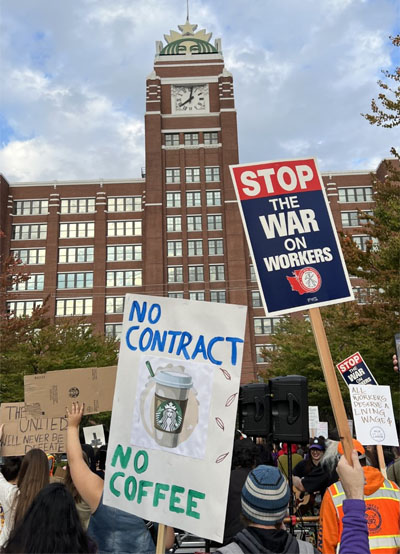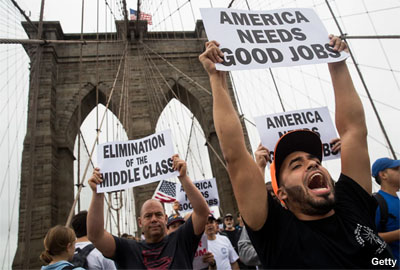NEWS ROUNDUP
Starbucks needs PRO Act | Safe staffing update | AFL-CIO hails Julie Su
Wednesday, March 1, 2023
WHY AMERICA NEEDS THE PRO ACT

► From Bloomberg — Starbucks faces new front in its labor disputes: White-collar workers — Dozens of white-collar Starbucks Corp. employees and managers have signed an open letter protesting the company’s return-to-office mandate and its alleged union-busting, opening a new front in the battle over the avowedly progressive coffee chain’s treatment of its staff. In a letter sent to senior executives and board members, the workers wrote: “We love Starbucks, but these actions are fracturing trust in Starbucks leadership. Morale is at an all-time low, and the brand reputation and financial value of this publicly traded company are at risk.” Both violating baristas’ unionization rights, and subjecting white-collar staff to an abrupt return-to-office mandate, the letter argues, reflect the same problem: “Not listening to partners.”
► From Crosscut — Newly-formed unions in WA face a long road to first contracts –Starbucks stands among a broader resurgence in unionization efforts across tech, service and retail industries in the wake of the pandemic. Washington-based corporations like Amazon, REI and Microsoft have increasingly grappled with unprecedented labor activity, while many other regional workers, from Seattle teachers to Yakima farmworkers, have flexed their collective-bargaining strength in recent months. But unionizing is just the beginning of a long process. A Bloomberg Law analysis found it takes, on average, 465 days from unionizing to signing a first contract. Organizers from a variety of industries describe a slew of challenges and alleged retaliation working against them during that vulnerable period, including store closures, firings, reduced hours, perks for nonunion staff and long bargaining delays.
TODAY at The Stand — Richard L. Trumka PRO Act reintroduced in Congress — This landmark worker empowerment, civil rights and social justice legislation– which includes facilitating first contract agreements by requiring mediation and arbitration to settle disputes — is an essential component to ensuring the economy works for all of us.
TAKE A STAND — Please sign this AFL-CIO petition and add your name to the list of supporters of the Richard L. Trumka PRO Act.
The Stand (Jan. 19) — Washington remains the 3rd most unionized state
 ► A MUST-READ from NPR — You may have heard of the ‘union boom.’ The numbers tell a different story — While there was an uptick in labor organizing in 2022, we’re hardly witnessing a rejuvenated movement strong enough to reverse unions’ long-run decline. That’s despite a historically tight labor market, worker dissatisfaction with their employers during the pandemic, a U.S. president who has proclaimed himself as “the most pro-union president leading the most pro-union administration in American history,” and the fact that unions are now more popular than they’ve been at any time since the 1960s. What gives?
► A MUST-READ from NPR — You may have heard of the ‘union boom.’ The numbers tell a different story — While there was an uptick in labor organizing in 2022, we’re hardly witnessing a rejuvenated movement strong enough to reverse unions’ long-run decline. That’s despite a historically tight labor market, worker dissatisfaction with their employers during the pandemic, a U.S. president who has proclaimed himself as “the most pro-union president leading the most pro-union administration in American history,” and the fact that unions are now more popular than they’ve been at any time since the 1960s. What gives?
“American labor law just puts an enormous barrier in the way of workers joining a union,” says Suresh Naidu, an economist at Columbia University who has emerged in recent years as a leading scholar of unions in America. He says our labor laws make it relatively easy for employers to short-circuit organizing efforts. And even when some of their tactics are technically illegal, Naidu says, companies are given wide latitude to thwart unionizing with minimal legal sanctions. Union organizers are forced to strategize and organize outside their workplace and figure out how to convince coworkers to join the fight without getting penalized or fired. “Workers basically have to be like a little Navy SEAL team in order to successfully unionize under the radar of an employer,” Naidu says.
► From the Guardian — ‘Old-school union busting’: how U.S. corporations are quashing the new wave of organizing — The NLRB, the federal agency that polices labor-management relations, has accused Starbucks and Amazon of a slew of illegal anti-union practices, among them firing many workers in retaliation for backing a union. Nonetheless, many workplace experts question whether the NLRB’s efforts, no matter how vigorous, can assure that workers have a fair shot at unionizing.
LOCAL
► From the Seattle Times — As investigations mount, Seattle-area worker describes Amazon’s toll — Amazon is facing workplace safety investigations from the Occupational Safety and Health Administration, Washington’s Department of Labor & Industries, and the U.S. Department of Justice. Earlier this year, after roughly six months of inspections, OSHA determined Amazon failed to keep its workers safe. It pointed to, among other things, the weight of items handled by workers, awkward motions like twisting, bending and lifting, and long hours.
► From the Seattle Times — Seattle Convention Center contractors face wrongful death lawsuit — The wife of Bryan Phillips, a 31-year-old member of the local Cement Masons & Plasterers union who was killed during the expansion of the Seattle Convention Center, says project contractors ignored warning signs about the conditions that led to her husband’s death.
► From the News Tribune — Light rail from Tacoma to Seattle delayed again. Here’s why, according to Sound Transit — The agency says it found the need for more station options in Fife due to flood-plain issues. It also needed another route in the south Federal Way/Milton area to avoid adverse effects to cultural resources and construction challenges along the planned route along I-5.
► From the Peninsula Daily News — Clallam County may incentivize hiring, retention for certain positions — The commissioners have asked their administrative team to come back with a proposal for hiring and retention incentives for deputy prosecutors, public works engineers and public health nurses.
THIS WASHINGTON
 ► From WA Safe + Healthy — Healthcare union statement on safe staffing committee passage — The WA Safe + Healthy Coalition (SEIU Healthcare 1199NW, UFCW 3000, and the Washington State Nurses Association) are pleased that SB 5236 has cleared the Senate Ways and Means Committee. Under the current language, hospitals will still have to follow staffing plans, but staff-to-patient staffing standards will be set by nurse staffing committees. These staffing committees already exist within hospitals, but healthcare workers have long voiced concerns that agreed-upon staffing plans are often ignored or vetoed by hospital executives. New standards will allow the Department of Labor and Industries to step in to issue corrective action plans – in the form of staffing standards – to hospitals that are noncompliant with these plans.
► From WA Safe + Healthy — Healthcare union statement on safe staffing committee passage — The WA Safe + Healthy Coalition (SEIU Healthcare 1199NW, UFCW 3000, and the Washington State Nurses Association) are pleased that SB 5236 has cleared the Senate Ways and Means Committee. Under the current language, hospitals will still have to follow staffing plans, but staff-to-patient staffing standards will be set by nurse staffing committees. These staffing committees already exist within hospitals, but healthcare workers have long voiced concerns that agreed-upon staffing plans are often ignored or vetoed by hospital executives. New standards will allow the Department of Labor and Industries to step in to issue corrective action plans – in the form of staffing standards – to hospitals that are noncompliant with these plans.
The Stand (updated today) — Status report on pro-worker bills in Olympia
► From the Senate Democrats — Senate unanimously passes bill to help construction workers with paid sick leave — On Monday, the state senate unanimously passed SB 5111, sponsored by Sen. Karen Keiser (D-Des Moines), to help short-term construction workers accrue paid sick leave.
► From the Seattle Times — WA ferries restores service to some routes, delays others — The ferry system was hobbled early in the pandemic as ridership tanked and staff left in droves due to retirements, transfers and firings. Without adequate crew to run the boats, the ferry system cut sailings at every dock. Hiring picked up in 2022, with the system adding 61 fleet employees. But the ferries are still well below ideal staffing levels.
 ► From the (Everett) Herald — Everett schools may slash 140 jobs, shutter virtual academy — As many as 142 full-time positions may be eliminated, including elementary and secondary teachers, in the school board’s blueprint for overcoming a looming $28 million budget deficit next school year. Everett School District, like many others around the state, faces a confluence of threats to their budget next school year. Enrollment is down and inflation is up. Federal pandemic aid is going away and state dollars aren’t enough to make up the loss.
► From the (Everett) Herald — Everett schools may slash 140 jobs, shutter virtual academy — As many as 142 full-time positions may be eliminated, including elementary and secondary teachers, in the school board’s blueprint for overcoming a looming $28 million budget deficit next school year. Everett School District, like many others around the state, faces a confluence of threats to their budget next school year. Enrollment is down and inflation is up. Federal pandemic aid is going away and state dollars aren’t enough to make up the loss.
► From the (Longview) Daily News — Longview School District braces for possible $6M shortfall over the next four years — School district officials are preparing for the worst, but say a lot could change, and state legislation could offer more funding by the time the 2023 session ends in April.
► From the Spokesman-Review — 38,000 people in Spokane County could lose Medicaid coverage as COVID public health emergency ends
THAT WASHINGTON
 ► From the AP — Biden says Labor nominee Julie Su represents American dream — President Joe Biden said Wednesday that his labor secretary nominee Julie Su is a “real leader” who has supported unions, enforced worker safety and protected the victims of human trafficking. “Julie is the American dream,” Biden said. “She’s committed to making sure that dream is in reach for every American.”
► From the AP — Biden says Labor nominee Julie Su represents American dream — President Joe Biden said Wednesday that his labor secretary nominee Julie Su is a “real leader” who has supported unions, enforced worker safety and protected the victims of human trafficking. “Julie is the American dream,” Biden said. “She’s committed to making sure that dream is in reach for every American.”
EDITOR’S NOTE — Watch Biden’s remarks on Su’s nomination.
► From the AFL-CIO — AFL-CIO applauds nomination of Julie Su to become nation’s next Secretary of Labor — AFL-CIO President Liz Shuler: “Simply put: There’s no one more dedicated and qualified to defend the fundamental rights of working people than Julie Su. It’s her life’s work. The AFL-CIO is thrilled with her historic nomination to become our nation’s next secretary of labor.”
► From the Washington Post — Millions could see cuts to food stamps as federal pandemic aid ends — For low-income households enrolled in the program, known as SNAP, the cuts could reduce their benefits by an average $182 per month.
► From the Seattle Times — Food insecurity persists in WA, just as emergency benefits expire
 ► From the AP — Supreme Court seems ready to reject student loan forgiveness — Conservative justices holding the Supreme Court’s majority seem ready to sink President Joe Biden’s plan to wipe away or reduce student loans held by millions of Americans.
► From the AP — Supreme Court seems ready to reject student loan forgiveness — Conservative justices holding the Supreme Court’s majority seem ready to sink President Joe Biden’s plan to wipe away or reduce student loans held by millions of Americans.
► From the LA Times — Supreme Court conservatives may want to block student loan forgiveness. But they’ve hit a snag (by Harry Litman) — The court has insisted on strictly policing the constitutional requirement that the federal judiciary may hear only those cases in which the plaintiff has sustained an “injury in fact” — a concrete, particular harm. Here that restriction is very much in play. Biden vs. Nebraska was brought by six Republican attorneys general who oppose student loan forgiveness for political reasons. That’s fine, but they still need to demonstrate an injury in fact. And none of the states seems to have sustained any sort of injury from student loan forgiveness: What’s it to them if the federal government doesn’t want its $20,000 back from any given borrower?
► From Politico — GOP urges no ‘burdensome regulations’ on freight rail, after derailment
 ► From The Hill — Senate group wades into tough talks on Social Security — Senators from both parties who have been involved in the talks are tight-lipped when it comes to revealing details, though reports have begun to surface of discussions of potential changes to the age threshold for retirement and raising the taxable wage cap.
► From The Hill — Senate group wades into tough talks on Social Security — Senators from both parties who have been involved in the talks are tight-lipped when it comes to revealing details, though reports have begun to surface of discussions of potential changes to the age threshold for retirement and raising the taxable wage cap.
► From the Washington Post — Raising the retirement age would only delay the deluge (by Philip Bump) — A group of senators is reportedly mulling increasing the age at which a retiree is eligible for full Social Security benefits to 70. Data shows that would have a short-term effect but isn’t, by itself, a long-term solution.
► From the NY Times — How not to panic about Social Security (by Paul Krugman) –Life expectancy has indeed risen a lot for the affluent, but for the less well-paid members of the working class, it has hardly risen at all. What this means is that calling for an increase in the retirement age is, in effect, saying that janitors can’t be allowed to retire because lawyers are living longer.
NATIONAL
► From the LA Times — While workers struggled during the pandemic, CEO pay went up, up, up (by Michael Hiltzik) — Corporate boards have found ways to circumvent efforts to rein in executive pay through tax rules, shareholder voting options, and moral suasion. Even the unique economic head winds of the COVID pandemic failed to put a leash on the rise of CEO pay — boards simply used the pandemic as an excuse to rejigger executive pay packages so they wouldn’t be penalized for business conditions said to be beyond their control.

► From the NY Times — As dollar stores proliferate, some communities say ‘no’ — More than 70 proposed dollar stores have been rejected since 2019, a report shows. It’s a small number compared with those that opened but evidence of opposition to the industry. The stores typically operate with lean staffing, and their employees, by some measures, are paid at the bottom of the retail industry’s scale. According to a survey by the Economic Policy Institute, a liberal think tank, 92 percent of Dollar General workers earn less than $15 an hour, lower than many other companies surveyed, including Burger King, Walmart and Dunkin’. About 20 percent of Dollar General workers earn less than $10 an hour.
 EDITOR’S NOTE — Ready to get paid a livable wage? Get more information about how you can join together with co-workers and negotiate a fair return for your hard work. Or go ahead and contact a union organizer today!
EDITOR’S NOTE — Ready to get paid a livable wage? Get more information about how you can join together with co-workers and negotiate a fair return for your hard work. Or go ahead and contact a union organizer today!
► From the NY Times — Many undocumented immigrants are departing after decades in the U.S. — Crowded scenes at the border do not necessarily translate into an increase in the undocumented population. Many other immigrants have been returning home.
► From Reuters — Caterpillar reaches tentative deal with union, averting possible strike
► From Reuters — GM cutting hundreds of jobs to reduce costs
The Stand posts links to Washington state and national news of interest every weekday morning by 10 a.m.






